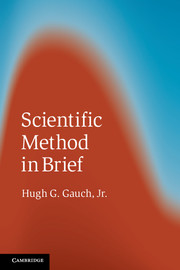Book contents
- Frontmatter
- Contents
- Foreword
- Preface
- 1 Introduction
- 2 Four bold claims
- 3 A brief history of truth
- 4 Science's contested rationality
- 5 Science's presuppositions
- 6 Science's powers and limits
- 7 Deductive logic
- 8 Probability
- 9 Inductive logic and statistics
- 10 Parsimony and efficiency
- 11 Case studies
- 12 Ethics and responsibilities
- 13 Science education
- 14 Conclusions
- References
- Index
10 - Parsimony and efficiency
Published online by Cambridge University Press: 05 November 2012
- Frontmatter
- Contents
- Foreword
- Preface
- 1 Introduction
- 2 Four bold claims
- 3 A brief history of truth
- 4 Science's contested rationality
- 5 Science's presuppositions
- 6 Science's powers and limits
- 7 Deductive logic
- 8 Probability
- 9 Inductive logic and statistics
- 10 Parsimony and efficiency
- 11 Case studies
- 12 Ethics and responsibilities
- 13 Science education
- 14 Conclusions
- References
- Index
Summary
The principle of parsimony recommends that from among theories fitting the data equally well, scientists choose the simplest theory. It has four common names, also being called the principle of simplicity, the principle of economy, and Ockham's razor (with Ockham sometimes latinized as Occam).
This book's account of science's evidence, which is the “E” portion of the PEL model, takes the form primarily of this chapter's detailed analysis of parsimony. Mere data or observations become evidence when they are brought to bear on hypotheses or theories. This impact of data on theory is guided by several criteria, including the fit of the data with the theory and the parsimony of the theory. Most aspects of evidence are rather obvious to scientists and most evidence is gathered by means of specialized techniques used only within a given discipline. Accordingly, most of what needs to be said about scientific evidence is in the domain of specialized disciplines rather than general principles. However, the one great exception is parsimony, which is not obvious to many scientists, and yet considerations of parsimony pervade all of the sciences, so it is among science's general principles.
Information
- Type
- Chapter
- Information
- Scientific Method in Brief , pp. 174 - 198Publisher: Cambridge University PressPrint publication year: 2012
